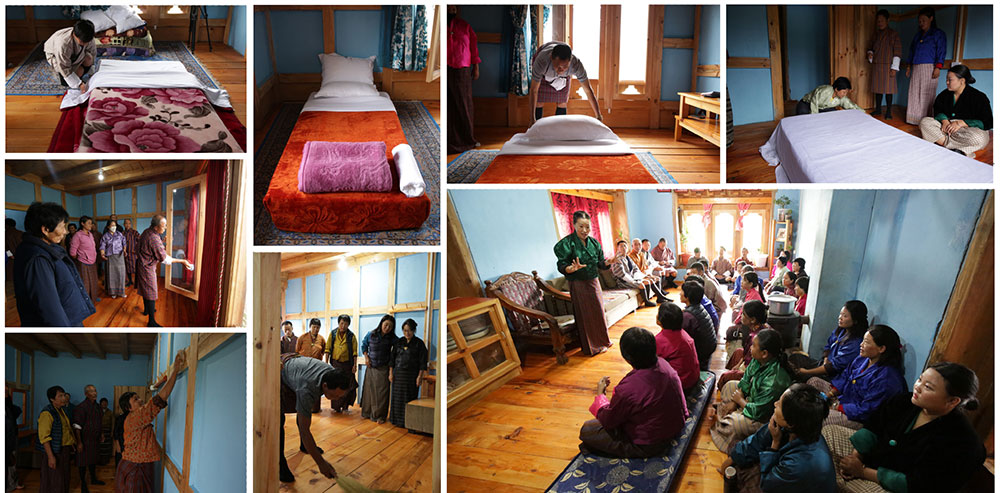Yangyel Lhaden
Kinley Dem from Damchi, Punakha, is repairing her house. She is constructing a bathroom attached to the house and moving the stairway inside for easier access to the second floor.
She has been working hard to meet the checklist of 37 requirements for homestay certification from the Department of Tourism, which will allow her to start a village homestay as an alternative source of income.
Kinley Dem is one of the 66 participants who underwent a week-long homestay management training in Gangtey-Phobjikha in August conducted by the Royal Society for the Protection of Nature (RSPN) co-funded by Department of Tourism.
This training is part of the project titled “Developing ecosystem-based solutions for managing biodiversity landscapes in Bhutan” supported by Germany’s Federal Ministry for the Environment, Nature Conservation, and Nuclear Safety through the International Climate Initiative, and co-funded by the MAVA Foundation in Switzerland.
The project aims to improve the livelihoods of people living in six dzongkhags in white-bellied heron (WBH) habitats by initiating sustainable livelihoods within the community to coexist with the WBH habitat.
“Community-based Tourism (CBT) is one of the key livelihood programmes of RSPN, to incentivise people living in WBH habitat as the community and WBH coexist by sustainable means,” Khachi Wangmo, a Project Officer with RSPN said. “It is important to bring the community on board to conserve WBH and protect its habitat and empower them to do so.”
“When we focus on village homestays as a key CBT product, people look at business in the front, and at back of their minds, they address the reason why visitors are visiting their destination where they keep WBH conservation in their minds,” she said.
In a week-long training, participants were divided into three groups and stayed in homestays. They switched homestays every two days so that they could experience at least three different homestays.
The training covered various topics, including hospitality and service skills, the skills necessary for being hospitable and having a good service attitude, cleanliness and sanitation, and cooking, among others.
The 62 participants residing in the WBH habitats under the project received a grant of Nu. 29,560, with the stipulation that the grant must be utilised within a three-month period. The purpose of this grant is to enhance the kitchen, toilet facilities, and make minor improvements to the houses of the participants.
As soon as Kinley Dem reached home from training, she went to a homestay nearby where she asked for help on how to improve her house. She used her Nu 100,000 saving and began uplifting her house.
“The training made a vast difference in me, and the first thing I became aware of was the condition of the toilet in my house,” Kinley Dem said. “People often come looking for homestays in my village, and we sometimes host guests. Now, I’m confident in officially starting to make a living out of homestays.”
“I am grateful that because of the WBH, we are receiving such training and support, and it is important for me to give my full potential when such opportunities come my way,” Kinley Dem stated. “Now, if I see anyone harming the bird, I will report it to the authorities.”
Khachi Wangmo mentioned that based on their prior experiences with homestays, they observed a beneficial impact on livelihoods, enhancements in health and sanitation, as well as an increase in the empowerment of women.
Passang Zam has been running a homestay business for the past 14 years in Gangtey. In her house, she proudly displays antiques. When she receives an excess number of guests, she shares them with her fellow homestay owners.
Passang Zam is also responsible for managing her accounts. “In my village, homestays have brought us closer together,” she said.


